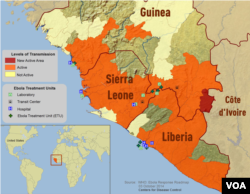Liberia's ambassador to the United States Jeremiah Sulunteh told VOA Tuesday that his country needs more support than what it has received so far to fight the Ebola epidemic.
That echoes President Barack Obama's opinion expressed a day earlier, criticizing foreign governments for not acting "as aggressively as they need to" against the outbreak.
"Countries that think that they can sit on the sidelines and just let the United States do it, that will result in a less effective response, a less speedy response, and that means that people die,” Obama said.
Sulunteh said that "as you wait for the bureaucracy and involve some red tapes, a lot of people are dying. The Ebola virus is not a conventional warfare where you can have peace conferences, go to meetings and sit to discuss. The more you wait, the more people are being infected.”
He also warned the Ebola epidemic could become a global issue rather than a regional one if the international community doesn't act quickly.
While Sulunteh applauded efforts that have been made so far, he says his country needs more containment centers and more beds.
"We need ambulances to take people from the communities to the treatment centers. We need to train more contract tracing agents," he said. "We need to train more community health workers.”
Part of the reason why Ebola has spread so far in Liberia is due to the lack of ambulances, he said. When "affected people ride a taxi or bus and a group of people unknowingly ride the same taxi, they get infected.”
While many organizations are saying they will help, Sulunteh says they need to do it now because time is running out.
As of October 3, the World Health Organization reported there were 3,834 confirmed, probable and suspected Ebola cases in Liberia and 2,069 deaths (that includes 934 confirmed, 677 probable and 458 suspected deaths).
Recently, some U.S. lawmakers have called for flight bans to and from the most affected countries. But Sulunteh is appealing to the international community not to isolate the countries more because it will have serious consequences to their economies as well.
“We’d have a setback in helping to contain the virus, setback on humanitarian efforts and philanthropic organizations that want to help out. Even the economy is being affected indirectly. Investors are holding back. People are not traveling back and forth,” he said.
Liberia was set to report economic growth of about 7.8 percent, but the ambassador said those gains have been reversed.
“Currently as I speak to you, civil servants have not been working since August," he said. "The productive capacity has been diminished, and if you cannot be producing, then it affects our overall GDP."
Thomas Eric Duncan, the first Liberian patient in the United States diagnosed with Ebola, died Wednesday at a hospital in Texas.
Sulunteh hopes that Liberians in the diaspora are not stigmatized. Recent reports say that service workers, like tutors, have been reluctant to go into the Liberian communities for fear of catching Ebola.
He said “the U.S. is a civilized country. We don’t envision Liberians being stigmatized.”





